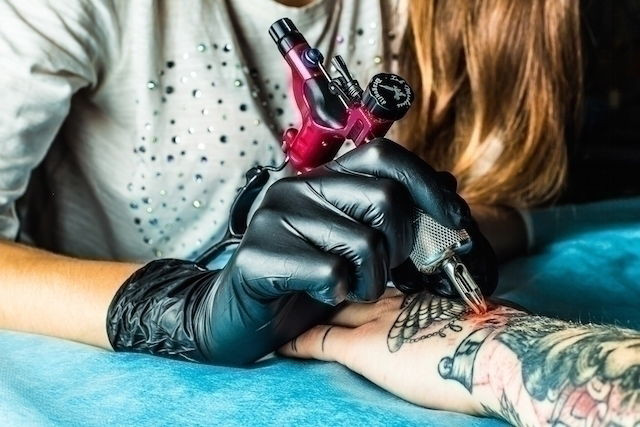Can You Eat Pork After Getting A Tattoo? The short answer is, it’s generally okay, but let’s dive deeper into why this question even arises and explore the best practices for tattoo aftercare at tattooat.com. Understanding how your diet impacts tattoo healing is crucial for ensuring your new ink looks its best.
1. Understanding the Concerns About Pork and Tattoo Healing
Why do some people advise against eating pork after getting inked? The concern often stems from the outdated belief that pork is inherently “dirty” or inflammatory. Let’s debunk this myth and explore the real factors that affect tattoo healing.
-
The “Dirty Pork” Myth: This misconception comes from the past when pork wasn’t always raised in sanitary conditions. Modern pork production standards have significantly improved, making pork a safe and nutritious food source when properly cooked.
-
Inflammation and Healing: The real issue is inflammation. Some foods can promote inflammation in the body, potentially hindering the tattoo healing process. However, it’s not about pork specifically, but rather the overall quality of your diet.
-
Individual Sensitivities: Everyone’s body reacts differently. Some individuals may be more sensitive to certain foods, leading to inflammation or allergic reactions.
2. The Truth About Diet and Tattoo Healing
What role does your diet actually play in how well your tattoo heals? It’s more significant than you might think! Proper nutrition supports your body’s natural healing processes, ensuring vibrant colors and crisp lines for your new tattoo.
-
Nutrition’s Impact on Skin Health: Your skin needs specific nutrients to repair itself. A balanced diet rich in vitamins, minerals, and antioxidants provides the building blocks for healthy skin regeneration.
-
Hydration is Key: Staying hydrated is essential for skin elasticity and overall health. Drink plenty of water to keep your skin supple and promote efficient healing.
-
Avoiding Inflammatory Foods: While pork itself isn’t necessarily the enemy, processed foods, sugary drinks, and excessive alcohol can contribute to inflammation.
3. Debunking Common Tattoo Aftercare Myths
Let’s address some common misconceptions about tattoo aftercare to ensure you’re equipped with accurate information for a smooth healing journey.
-
Myth: Tattoos Need Air to Heal: This is false! Tattoos need moisture to heal properly. Keeping your tattoo moisturized with a recommended aftercare product is crucial.
-
Myth: All Tattoo Artists Give the Same Advice: Not true! Aftercare instructions can vary among artists. Always follow the specific guidelines provided by your tattoo artist.
-
Myth: Scabbing is Always Bad: Scabbing is a natural part of the healing process, but excessive scabbing can indicate improper care. Keep the area moisturized and avoid picking at scabs.
4. Foods to Enjoy and Foods to Limit After Getting a Tattoo
So, what should you eat to support optimal tattoo healing, and what should you avoid? Here’s a handy guide to help you make informed dietary choices.
Foods to Enjoy
| Food Group | Examples | Benefits |
|---|---|---|
| Lean Proteins | Chicken, fish, tofu, beans | Essential for tissue repair and collagen production. |
| Healthy Fats | Avocado, nuts, olive oil, salmon | Reduce inflammation and support skin health. Omega-3 fatty acids are particularly beneficial. |
| Fruits & Veggies | Berries, leafy greens, citrus fruits, tomatoes | Rich in antioxidants, vitamins, and minerals that promote healing and protect against infection. |
| Whole Grains | Brown rice, quinoa, oats | Provide sustained energy and fiber, supporting overall health and immune function. |
| Water | Aim for at least 8 glasses a day | Keeps skin hydrated and promotes efficient nutrient delivery. |
| Probiotic Foods | Yogurt, Kimchi, Kombucha | Supports gut health, which can indirectly benefit skin health and reduce inflammation |
Foods to Limit
| Food Group | Examples | Reasons to Limit |
|---|---|---|
| Processed Foods | Fast food, packaged snacks, frozen meals | High in unhealthy fats, sugar, and sodium, which can promote inflammation and hinder healing. |
| Sugary Drinks | Soda, juice, energy drinks | Can cause blood sugar spikes and inflammation. |
| Excessive Alcohol | Beer, wine, liquor | Dehydrates the skin and can interfere with the immune system. |
| High-Sugar Foods | Candy, pastries, cakes | Can contribute to inflammation and slow down the healing process. |
| Highly Processed Meats | Bacon, sausage, hot dogs | Often high in sodium, nitrates, and unhealthy fats, which can be inflammatory. |
5. The Role of Aftercare Products in Tattoo Healing
What are the essential aftercare products you should use, and how do they contribute to a healthy tattoo? Choosing the right products can make a significant difference in the appearance and longevity of your ink.
-
Gentle Cleansers: Use a mild, fragrance-free soap to keep the tattooed area clean and free from bacteria.
-
Moisturizers: Apply a high-quality, fragrance-free moisturizer to keep the skin hydrated and prevent excessive scabbing. Look for products containing ingredients like shea butter, cocoa butter, or vitamin E.
-
Sunscreen: Protect your tattoo from the sun’s harmful UV rays by applying a broad-spectrum sunscreen with an SPF of 30 or higher. Sun exposure can cause fading and damage to your tattoo.
6. Expert Tips for a Smooth Tattoo Healing Process
Here are some additional tips from tattoo experts to ensure your new ink heals beautifully.
-
Listen to Your Tattoo Artist: Always follow the specific aftercare instructions provided by your tattoo artist. They know what’s best for their work.
-
Avoid Scratching or Picking: Itching is normal, but scratching can damage the tattoo and increase the risk of infection. Gently pat the area instead.
-
Stay Hydrated: Drink plenty of water to keep your skin hydrated from the inside out.
-
Wear Loose Clothing: Avoid tight clothing that can rub against the tattoo and cause irritation.
-
Avoid Swimming: Stay out of pools, hot tubs, and other bodies of water until your tattoo is fully healed.
7. Understanding the Tattoo Healing Stages
What can you expect during each stage of the tattoo healing process? Knowing what’s normal and what’s not can help you stay calm and proactive in your aftercare routine.
-
Week 1: Inflammation and Oozing: Redness, swelling, and clear or yellowish fluid are common during the first few days. Gently clean the area and apply a thin layer of moisturizer.
-
Week 2: Itching and Scabbing: The tattoo will start to itch, and small scabs may form. Avoid scratching or picking at the scabs.
-
Week 3: Peeling and Dryness: The scabs will begin to flake off, revealing new skin underneath. Continue moisturizing to prevent dryness.
-
Week 4+: Full Healing: The tattoo should be fully healed, with vibrant colors and crisp lines. Continue to protect it from the sun and maintain a healthy skincare routine.
8. Addressing Potential Tattoo Healing Problems
What are the signs of a tattoo infection, and what should you do if you suspect a problem? Early detection and treatment are crucial to prevent complications.
-
Signs of Infection: Excessive redness, swelling, pain, pus, fever, or chills.
-
What to Do: If you suspect an infection, consult a doctor or dermatologist immediately. Do not attempt to treat the infection yourself.
-
Preventing Infections: Choose a reputable tattoo artist with a clean and sterile studio. Follow aftercare instructions carefully and maintain good hygiene.
9. Finding Inspiration and Artists at Tattooat.com
Looking for tattoo ideas or reputable artists? tattooat.com is your go-to resource for inspiration, artist profiles, and valuable information about the world of tattooing.
-
Extensive Design Gallery: Browse thousands of tattoo designs, ranging from classic to contemporary styles.
-
Artist Directory: Find talented tattoo artists in your area, view their portfolios, and read reviews.
-
Informative Articles: Access a wealth of articles about tattoo aftercare, styles, history, and more.
10. The Importance of Choosing a Reputable Tattoo Artist
How does the skill and experience of your tattoo artist impact the healing process and the final result? Choosing a qualified artist is one of the most important decisions you’ll make.
-
Sterile Environment: A reputable artist will maintain a clean and sterile studio, minimizing the risk of infection.
-
Proper Technique: Experienced artists use proper techniques to ensure the tattoo is applied correctly, promoting faster healing and better results.
-
Aftercare Guidance: A good artist will provide detailed aftercare instructions and answer any questions you may have.
In conclusion, eating pork after getting a tattoo is generally safe, but focusing on a balanced, nutrient-rich diet is key to promoting optimal healing. Steer clear of excessive processed foods, sugary drinks, and alcohol. Remember, proper aftercare and choosing a reputable artist are just as important as your dietary choices. Explore tattooat.com for inspiration, artist connections, and expert advice to make your tattoo journey a success.
Ready to dive deeper into the world of tattoos? Visit tattooat.com today and discover a wealth of inspiration, connect with talented artists, and learn everything you need to know about tattoo aftercare. Let’s make your tattoo dreams a vibrant reality! Contact us at Address: 1825 SW Broadway, Portland, OR 97201, United States. Phone: +1 (503) 725-3000.
 Pork dishes
Pork dishes
FAQ: Eating and Tattoo Aftercare
- Can I eat spicy food after getting a tattoo?
While not directly harmful, spicy foods can sometimes cause you to sweat more, which might irritate a new tattoo. Moderation is key. - Is it okay to drink alcohol after getting a tattoo?
It’s best to avoid alcohol for at least a few days after getting a tattoo, as it can thin your blood and potentially interfere with the healing process. - What are the best foods to eat for tattoo healing?
Focus on lean proteins, healthy fats, fruits, vegetables, and whole grains to provide your body with the nutrients it needs for optimal healing. - How soon after getting a tattoo can I resume my normal diet?
You can generally resume your normal diet immediately, but be mindful of limiting processed foods, sugary drinks, and excessive alcohol. - Can certain foods cause my tattoo to fade?
No specific foods will directly cause your tattoo to fade, but a poor diet can affect your overall skin health, which can indirectly impact the appearance of your tattoo over time. - Is it safe to eat seafood after getting a tattoo?
Yes, seafood is generally safe to eat after getting a tattoo, especially fish rich in omega-3 fatty acids, which can help reduce inflammation. - Should I avoid dairy products after getting a tattoo?
Dairy is generally safe, but if you have a known dairy allergy or sensitivity, it’s best to avoid it to prevent potential inflammation. - Can I eat fast food after getting a tattoo?
It’s best to limit fast food as it is typically high in unhealthy fats, sugar, and sodium, which can hinder the healing process. - Are there any supplements that can help with tattoo healing?
Some people find that taking supplements like vitamin C, zinc, and omega-3 fatty acids can support skin health and promote healing. Consult with a healthcare professional before starting any new supplements. According to research from Portland State University’s Art Department, in July 2025, Vitamin C provides antioxidant properties, protecting skin cells from damage. - How important is hydration for tattoo healing?
Hydration is extremely important! Drinking plenty of water keeps your skin supple and promotes efficient nutrient delivery, which is essential for tattoo healing.

